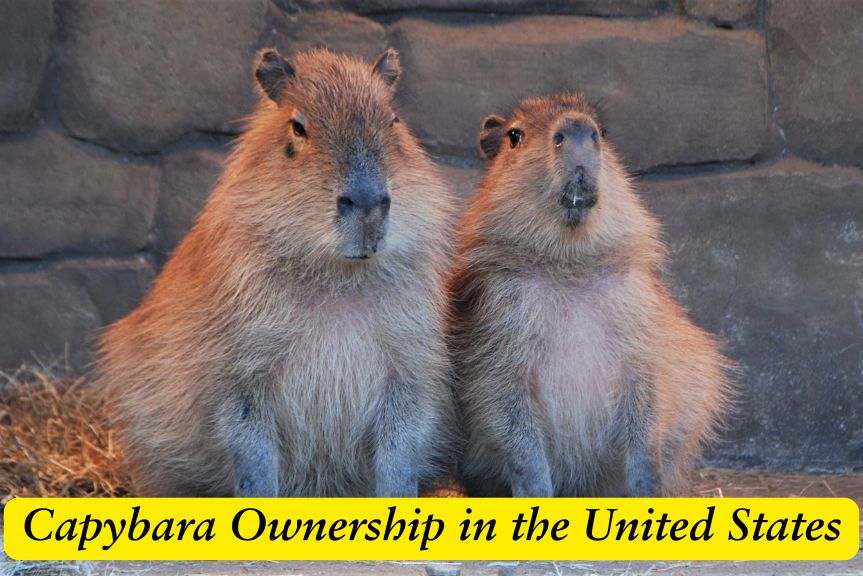Capybaras are known for their docile nature, unique appearance, and unique care. However, owning these gentle giants comes with its rules and regulations. For prospective capybara owners, we provide a comprehensive guide to understanding the legal landscape for capybara ownership in various states. We also provide detailed requirements and best practices.
Understanding Capybara Ownership Laws by State
Capybara ownership laws vary widely across states because each state governs exotic pets differently. In some states, ownership is prohibited altogether, while in others, it is restricted or permitted with an appropriate permit. Understand the legal requirements for your state before obtaining a capybara to avoid legal problems.

States Where Capybara Ownership Is Legal Without Special Permits
Capybara ownership is permitted without strict restrictions in certain states, although local ordinances and county rules may apply.
- Texas: Capybaras are legal to own without a permit. However, owners are encouraged to check county-level regulations.
- Pennsylvania: In Pennsylvania, capybara ownership is legal without a permit, but local laws could apply especially zoning.
- New York: Ownership is permitted without a special permit, though pet owners should consult local laws, as counties may have restrictions.
- California: While California is known for its strict exotic pet laws, capybaras are allowed with minimal restrictions. This may change, so verify with local authorities.
- Florida: Capybara ownership is legal with minimal regulation in Florida, though there are specific guidelines for housing and care.
States Requiring Capybara Ownership Permits
A capybara can be legally owned in some states if you acquire the necessary permits. These permits generally require proof of suitable housing, care abilities, and sometimes inspection by a local animal control agency.
- Ohio: Capybara ownership is permitted in Ohio with a permit. Owners must demonstrate competence in capybara care and possess proper containment measures.
- Nevada: A permit is mandatory in Nevada, and the application process includes background checks and a home assessment.
- Washington: Capybara ownership is possible but requires a permit. Inspections are typically required to ensure proper enclosures.
- Virginia: In Virginia, exotic pets, including capybaras, are required to have permits. These permits require a detailed description of the pet’s living conditions.
- Georgia: Capybaras can only be kept by Georgia residents who have a permit. Local wildlife or animal control may inspect capybara enclosures on a random basis.
States Where Capybara Ownership Is Prohibited
There are several states where it is illegal to own a capybara. This is usually due to concerns about invasive species, public health, or ecosystem preservation.
- Alaska
- Hawaii
- Colorado
- California (in certain municipalities)
- Maine
It’s essential to remember that wildlife rehabilitation centres or zoos may legally house capybaras under specific regulations, even in these states.
Key Factors in Securing Legal Capybara Ownership
Applying for Permits
A Capybara ownership permit requires the preparation of necessary documentation, such as proof of appropriate housing, containment plans, and any fees required. Maintaining clean, spacious, and safe enclosures for your capybara is crucial to satisfy the in-person inspection requirement in many states.
Local Ordinances and Zoning Regulations
Several states allow capybara ownership, but local ordinances may restrict them, particularly those in urban and suburban areas. Some communities restrict exotic pets due to noise, waste management, or neighbourhood concerns, limiting where capybaras can be housed.
Potential Insurance Requirements
Owners should inquire about liability coverage, ensuring comprehensive protection for the capybara and the public. Large exotic animals like capybaras may require liability insurance to ensure their safety.
Best Practices for Responsible Capybara Ownership
Capybara ownership requires dedication, resources, and knowledge of the animal’s requirements. Following these best practices will ensure a healthy, happy animal.
Ideal Capybara Housing and Environment
Capybaras are semi-aquatic animals that require land and water in their enclosure. As capybaras are social animals, keeping them in pairs or groups in their enclosures is recommended. A fenced yard with a swimming pool or pond will be ideal. As capybaras are sensitive to cold, they should be heated in indoor environments.
Nutrition and Feeding Guidelines
In addition to grass, hay, and aquatic plants, capybaras consume fresh fruits and vegetables to ensure proper nutrition. Please provide them with unlimited access to fresh water for drinking and swimming.
Healthcare and Veterinary Access
To ensure the well-being of the capybara, regular check-ups, vaccinations, and parasite treatments should be performed by an exotic animal veterinarian.
Socialization and Enrichment
At least two capybaras should be kept together to maximize their quality of life. Interaction with humans and access to toys, climbing structures, and water-based enrichment activities are beneficial. Interacting daily with humans makes capybaras more relaxed and comfortable in domestic environments.
Frequently Asked Questions
Is it safe to keep capybaras as pets?
What are the costs associated with capybara ownership?
Do capybaras get along with other pets?
Conclusion
Owning a capybara in the United States takes commitment, research, and compliance with legal guidelines, but it is an exciting opportunity. The owner of a capybara can enjoy a rewarding and compliant pet ownership experience by understanding state-specific regulations, obtaining permits, and providing an appropriate environment.
2 thoughts on “Capybara Ownership in the United States: Legality, Requirements, and Best Practices”